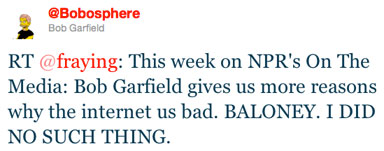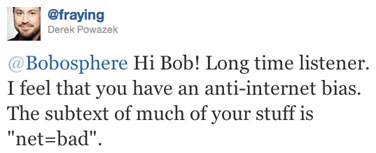How to Turn a Fan into an Enemy in Under 140 Characters
Because I’m a media dork, I’ve listened to NPR’s On The Media since its debut. It’s the first podcast I listen to when it’s new. I became a paying member of WNYC to support it. The show’s cohosts, Bob Garfield and Brooke Gladstone, are two of my media heroes.
But I’ve noticed over the years a vibe on the show, especially from Bob. Whenever the subject turned to the net, the tone became dismissive at best, outright hostile at worst. I’ve observed this problem in many journalists who got their start before the rise of the web, and struggle with the idea that the audience can talk back. Most of them came around eventually. And Bob has, too, a bit. He went from mocking Twitter to posting to his own Twitter account, albeit infrequently. Still, I cringe when I hear the words “Brooke Gladstone is away this week” at the top of the show, because it means no one’s going to counter Bob’s anti-internet tone.
This week’s show was no better or worse than the last few, but the combination of lamenting the speed modern news travels, the continuing refusal to understand that a tweet is not a news story, the mocking of the internet archeologists, the “see, I told you!” subtext of the interview with Brewster Kahle, and then the complete flashback of covering Second Life four years after it became a punchline for no other reason than to gawk at the people who spend all their time there … well, I lost it.
I tweeted this.
It was a joke. Like all jokes, it contained a bit of truth and a bit of exaggeration. I thought the exasperation of “Bad! Terribly bad!” made that obvious.
So imagine my surprise when Bob Garfield responded with, essentially, “nu-unh.”
I tried to clarify my point – an impossible task in tweet-length.
And then I did what anyone would do when they get caught criticizing someone they respect – I backpedaled. I thought if anyone would understand someone criticizing because they care, it’d be a critic.
At this point, I still thought I might be able to engage with him in a real discussion. Does he hate the internet? Maybe he’d be interested to hear that he was coming off that way from someone who’s been listening intently for a decade. Sadly, no.
So, let’s review.
- My “feelings” deserve quotes. Are they not my real feelings? Perhaps Bob knows me better than I know myself.
- I’m “demonstrably wrong.” Bob always uses the word “demonstrably” when he’s criticized, as if there’s only one way to interpret his body of work.
- I’m “annoying to put up with.” Dude, my wife has to put up with me – you do not. You know how to block people on Twitter, right?
- And then there’s this: “for crying out loud, use your head, not just your mouth.” Assuming that someone is not thinking because you disagree with them is arrogant in the extreme, but it is a great way to avoid considering their point.
After that, I followed Bob on Twitter, but regretted it when he direct messaged me something that I won’t screenshot out of respect for the assumed privacy of a DM. Let’s just say it wasn’t a peace offering.
This is a case study in what happens when traditional journalists come face to face with the the immediacy of the current media landscape and just can’t handle it. It’s especially ironic because, in the most recent OTM, traditional journalism’s inability to handle Twitter was discussed for ten minutes!
This is also a great example of how to turn a fan into an enemy in under 140 characters. I’m not going to go all Joker to Bob’s Batman because of a single insulting tweet, but I probably wouldn’t have started this site if he’d responded in any sort of reasonable way.
I tell our clients this all the time: there is something worse than getting criticized online – total silence. People criticize when they care, and that’s good. Every criticism is an opportunity to turn a critic into a lifelong believer by simply responding with respect and showing that you’re listening.
You’d think that someone who once penned a manifesto called “Listenomics” would take the time to, yaknow, listen. But Bob has made his hatred of online comments quite clear. So to him, I’m not a loyal listener, or a valued member, or even a published author with a long history of running newspapers, magazines, and websites. I’m just another online troll, spewing vitriol because that’s what people do online.
That he didn’t take the time to see who he’s talking to, hear what I was saying, or even calm down enough to disagree without insult, makes me sad. Not just to lose a personal hero, but also because it shows how much work we all have yet to do before we can really fulfill the promise of the great networked world we’re building.
Still, I should thank Bob for giving me the inspiration to start a new project. I’m also going to use his words in the future, when a client asks for advice on how to handle criticism online: “use your head, not just your mouth.”
Perhaps Bob will try it, too.





